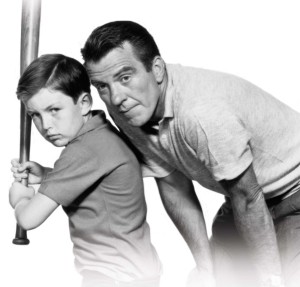How exactly DO we learn to parent? Is there a parenting gene? Are we born with the knowledge and the instinct? Do we learn most of what we know from articles and books? Or should there be college classes to help us learn to raise a child well? I do think there ought to be a class in diaper changing at least! As a first time Dad my inaugural solo diaper change was an adventure. Dealing with the “delicate odor” and disposing of the diaper, while simultaneously attempting to spotlessly clean her derriere, proved to be challenging. Her tiny legs were wiggling so much they reminded me of an eight-tentacled octopus! And when I finally did manage to get the diaper fastened and the legs aligned, I realized I had put it on backwards! Back to the drawing board… or more aptly, back to the changing table.
One way that many of us approach learning to parent is to harken back to our childhood memories of our own parents’ routines and philosophies. It’s an easy default to do what we know and parent like we were parented. But do we always want to?
I remember that my own Mom was very careful to always let me know that she was on my team. She was always there for me – sometimes loudly – attending Cub Scout and PTA meetings, helping with Science Fair projects, and of course cheering from the bleachers at all my baseball games.
My father tended to stay more behind the scenes, observing my baseball games from behind the outfield fence, out of sight but never so far that I wasn’t aware he was there. He generally gave me his honest and balanced opinions about how well I played, while my Mom always assured me I was the best player on the diamond. I like to think I learned unwavering positivity from my mother and infinite patience from my Dad, and that I brought those qualities to my own parenting style.
But as parents, we also vividly remember aspects of our parents’ arsenals we vowed never to repeat with our own children. I am a Baby Boomer and had Flower Child tendencies in my teen years, including a proclivity for colorful clothes that were unnerving to both of my parents. I recall my Dad making me change before a school dance, angrily insisting that no child of his was going to be seen in public wearing lime green Chenille bell bottom pants. As he made me change into boring black slacks, I muttered that my kids would always be allowed to wear whatever they wanted. Fast forward, of course, 25 years later, to me sitting on the couch as my young teenage daughter walked past, wearing a tight, midriff and navel-exposing blouse. As you probably guessed, my response was “Whoa, cowgirl! Where do you think you are going?” Whether we like it or not, we’d be foolish to deny our own parents’ influence on our parenting choices.
While parenting guides abound (I’m writing one myself right now!) many parents find that the guides they read and the philosophies they embrace are often in direct conflict with both instinct, and the behaviors we learned from our own parents. One parent of a teenager I know confided that, in spite of the dozens of books she’s read about listening mindfully and mirroring back her son’s point of view, she often hears herself saying her own father’s dreaded words: “Because I said so!”
There are many different influences on our parenting and our skills are continually evolving (or should be). Just as there is no right or wrong way for us to parent, our own parents came from many different parenting philosophies too. Perhaps your parents were strict and dogmatic or perhaps they were lenient and forgiving, but both are ways of showing love and support if done right.The important thing is to parent consciously, in a manner that reflects who we are as a person and accounts for the individuality of our child. And very helpful to that is thinking about our own parents’ styles and deciding what we liked, and what we didn’t about how they raised us.It can be as simple as “I want to be supportive and non-judgmental Mom, like my own Mom” or “I want to set high expectations like my Dad, but be much less rigid than he was”. That is a start to build upon a conscious philosophy for parenting rather than just falling back on what we know because we experienced it ourselves. Let’s face it, parenting will encompass trial and error. A lot of error! Know that and realize no parent is perfect, but we can make conscious choices.
We all have to develop our now unique Parenting Personality. A style that works for us and that we – and our kids – can feel comfortable with. That Parenting Personality will keep evolving and expanding with experience and time.
Trust your instincts, draw on the knowledge and tips you’ve collected, remember what your parents did and how that made you feel, make conscious choices about what you learned from them (or wish you hadn’t) and create and foster your own parenting progress.

 Dr. Michael Howard
Dr. Michael Howard
